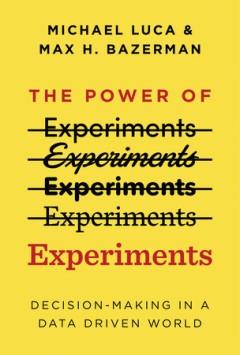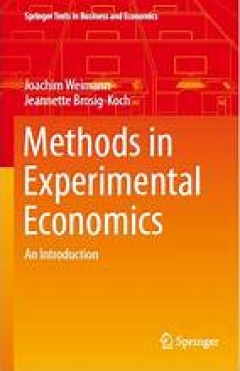Filter by

Verhaltensökonomische Aspekte bei Entscheidungen = Theorie und experimentell…
In diesem Open-Access-Buch werden Analyseergebnisse komplexer Abwägungsentscheidungen vorgestellt. Insbesondere werden verhaltensökonomische Aspekte wie Muster vorhersehbarer und doch hartnäckiger Fehlentscheidungen berücksichtigt. Zunächst wird ein Newsvendor-typisches, jedoch besser generalisierbares Entscheidungsproblem vorgestellt. Das Anwendungsbeispiel ist der Aufbau von Recyclingkap…
- Edition
- -
- ISBN/ISSN
- 9783658470364
- Collation
- XV, 160 hlm; ill., lamp.,
- Series Title
- -
- Call Number
- -

System-Aufstellungen und ihre naturwissenschaftliche Begründung = Grundlage …
In dieser Open-Access-Publikation liefert Thomas Gehlert eine konsistente, auf aktuellen Experimenten und Theorien basierte, fundierte natur- und neurowissenschaftliche Theorie, die den zugrundeliegenden Prozess bei Intuition (Bauchgefühl) und System-Aufstellung beschreiben kann. Damit schließt er eine theoretische Lücke, die die breite Akzeptanz unzähliger experimenteller Ergebnisse in Ent…
- Edition
- 1
- ISBN/ISSN
- 9783658291679
- Collation
- XXXVII, 646 ill; lamp
- Series Title
- -
- Call Number
- -

An Introduction to Cognitive Economics = The Science of Mistakes
This book introduces readers to “cognitive economics,” a rapidly emerging interdisciplinary science built on economic, psychological, and data scientific foundations. Throughout the book, economist Andrew Caplin provides new approaches to help scholars collaborate and solve problems that can shape economic outcomes and bridge the gap between theoretical knowledge and the real world. Divide…
- Edition
- 1
- ISBN/ISSN
- 9783031730429
- Collation
- XI, 158 hlm; ill., lamp.,
- Series Title
- -
- Call Number
- -

Reality Lost: Markets of Attention, Misinformation and Manipulation
This open access book looks at how a democracy can devolve into a post-factual state. The media is being flooded by populist narratives, fake news, conspiracy theories and make-believe. Misinformation is turning into a challenge for all of us, whether politicians, journalists, or citizens. In the age of information, attention is a prime asset and may be converted into money, power, and influ…
- Edition
- 1
- ISBN/ISSN
- 9783030008130
- Collation
- XXII, 144hlm; ill., lamp.,
- Series Title
- -
- Call Number
- -

Neuroökonomie
Das vorliegende Open-Access-Buch gibt einen Überblick über die Entwicklung der Neuroökonomie und ihre Fragestellungen. Die Neuroökonomie ist ein noch relativ junger Wissenschaftszweig, in dem kognitive Neurowissenschaftler und Ökonomen zusammenarbeiten. Dabei werden die neurologischen Prozesse bei der Verarbeitung ökonomischer Entscheidungen untersucht. Lena Dreher beleuchtet die Suche na…
- Edition
- 1
- ISBN/ISSN
- 978-3-658-37803-5
- Collation
- -
- Series Title
- -
- Call Number
- VIII, 201

The power of experiments :decision making in a data-driven world
How organizations--including Google, StubHub, Airbnb, and Facebook--learn from experiments in a data-driven world.OCLC-licensed vendor bibliographic record.
- Edition
- -
- ISBN/ISSN
- 9780262358255
- Collation
- 1 online resource (xiv, 211 pages)
- Series Title
- -
- Call Number
- -

Methods in Experimental Economics
This textbook provides a hands-on and intuitive overview of the methodological foundations of experimental economics. Experimental economic research has been an integral part of economic science for quite some time and is gaining more and more attention in related disciplines. The book addresses the design and execution of experiments, the evaluation of experimental data and the equipment of a…
- Edition
- 1
- ISBN/ISSN
- 978-3-319-93363-4
- Collation
- Ekonomi
- Series Title
- -
- Call Number
- 330

Diversity of Experimental Methods in Economics
This is the first book that examines the diverse range of experimental methods currently being used in the social sciences, gathering contributions by working economists engaged in experimentation, as well as by a political scientist, psychologists and philosophers of the social sciences. Until the mid-twentieth century, most economists believed that experiments in the economic sciences were im…
- Edition
- 1
- ISBN/ISSN
- 978-981-13-6065-7
- Collation
- Econometrics
- Series Title
- -
- Call Number
- 330

The Paradox of Points
In his research, Sören Köcher provides valuable insights on the paradoxical effects of the magnitude of a loyalty program medium—i.e. the sheer number of points, miles, or stamps credited for every purchase and required for reward redemption—on the central consumer decisions in loyalty program memberships. In sum, the results of twelve empirical studies reveal that high magnitude currenci…
- Edition
- 1
- ISBN/ISSN
- 978-3-658-09543-7
- Collation
- -
- Series Title
- Applied Marketing Science / Angewandte Marketingforschung
- Call Number
- XIX, 163, 27 b/w illustrations

Understanding Auctions
In recent years, auctions have become an important field and many markets have designed new and sophisticated auction models to assign different types of items. The prime goal of this book is to set an organized classification of the main auction mechanisms in a way that readers can understand the importance of auction design and the advantages and drawbacks of each model. Given the relevance o…
- Edition
- -
- ISBN/ISSN
- 978-3-319-08813-6
- Collation
- -
- Series Title
- -
- Call Number
- -
 Computer Science, Information & General Works
Computer Science, Information & General Works  Philosophy & Psychology
Philosophy & Psychology  Religion
Religion  Social Sciences
Social Sciences  Language
Language  Pure Science
Pure Science  Applied Sciences
Applied Sciences  Art & Recreation
Art & Recreation  Literature
Literature  History & Geography
History & Geography